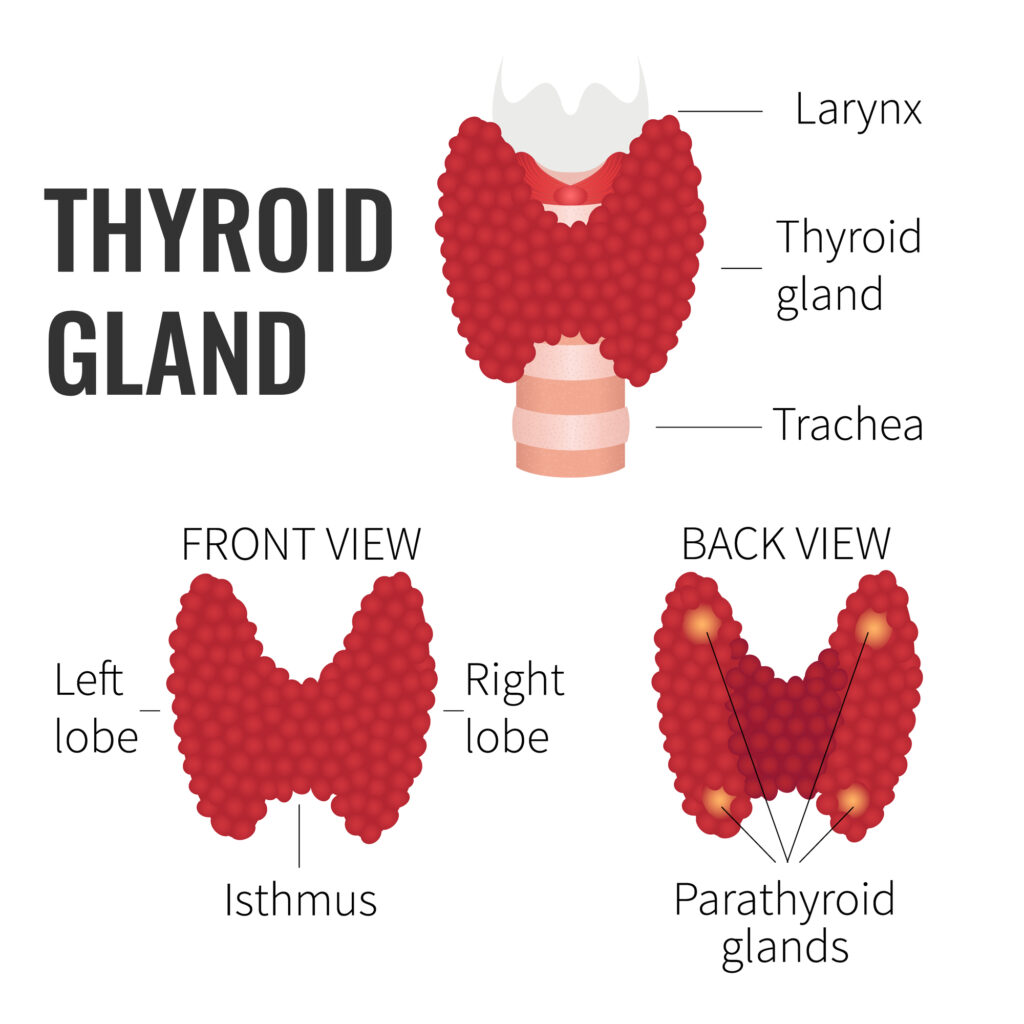I’m always tired. I can’t sleep. I can’t lose weight. I’m anxious or irritable…a lot.
If any of these sound like you, you could be suffering from an imbalanced thyroid. Thyroid symptoms are varied for each person; these are some common ones, depending on whether you have hypo or hyperthyroidism. Sometimes, you might be unaware that what you’re feeling is due to your thyroid. Sometimes, your doctor might put you on thyroid medication.
What if you were able to re-balance your thyroid, like when you were young, without meds? Let’s look at thyroid disease and how to naturally address it.
What Is The Thyroid Gland, Exactly?
The thyroid is a butterfly-shaped gland located in the neck, that plays a crucial role in maintaining overall health and well-being. From regulating metabolism to influencing energy levels, the thyroid is a powerhouse gland that not only deserves our attention but also needs to be addressed in order to have overall good health.

The Thyroid’s Crucial Functions:
The thyroid is more than just a regulatory organ—it’s a master conductor orchestrating various bodily functions in tandem with the adrenals and the pituitary, which is the master hormonal gland producing HGH (human growth hormone), the master hormone.
The thyroid gland produces primarily thyroxine (T4) and triiodothyronine (T3), hormones which influence metabolism, heart rate, and body temperature. Iodine is instrumental in their production, which is one reason why maintaining the proper levels of iodine in the body is so important. Maintaining a healthy thyroid is essential for balanced hormonal activity and overall well-being.
Why Thyroid Health is Vital:
Did you know your mood, how well your brain functions and how you feel emotionally are all influenced by your thyroid gland? A well-functioning thyroid is instrumental in supporting numerous bodily processes. The thyroid influences cognition, and overall mental health, and neglecting thyroid health can lead to a cascade of imbalances affecting various systems within the body. We’ll go more into that a bit later in the post.
There are two types of thyroid dis-ease: the more common hypothyroidism and hyperthyroidism.
Understanding Hypothyroidism:
Hypothyroidism occurs when the thyroid gland is underactive, it’s not producing enough thyroid hormones, resulting in a slowdown of bodily functions. Common symptoms include fatigue, weight gain, sensitivity to cold, dry skin, and muscle weakness.
These can lead to hypothyroidism:
- Autoimmune dis-eases like Hashimoto’s Disease, Fibromyalgia, MS. Autoimmune diseases happen when the immune system makes antibodies that attack healthy tissues. Sometimes that process involves the thyroid gland and affects its ability to make hormones.
- Thyroid surgery. Surgery to remove all or part of the thyroid gland can lower the gland’s ability to make thyroid hormones or stop it completely.
- Age. Hypothyroidism is more common in older than younger people, especially among women. This is often due to the rising incidence and prevalence of something called autoimmune thyroiditis (we’ll go into that in a moment). Also, the incidence of hypothyroidism steadily increases with advancing age. However, what I’ve seen and learned is, because we live in such a toxic environment these day, with so many endocrine system disruptors, even children are exhibiting imbalanced hormones. Being young doesn’t protect you from hormonal imbalance.
- Medicines. A number of medications may lead to hypothyroidism. Lithium, used to treat some psychiatric and mood disorders, is one. Medicines for hyperthyroidism can, too, like propylthiouracil (PTU), methimazole, radioactive iodine and potassium iodine. People who take amiodarone (Pacerone, Cordarone) to make their heart beat more regularly can be susceptible. Amiodarone contains a lot of iodine (almost 40%). It can cause hypothyroidism in two main ways: by directly blocking T3 from being formed, or block the body’s signal to make T3 and T4. You’re more vulnerable to developing hypothyroidism from amiodarone if your thyroid gland isn’t in great shape to begin with; Interleukin-2, which is usually used to treat cancers or leukemia; Interferon alfa is used to treat leukemia, melanoma, non-Hodgkin’s lymphoma, and Kaposi’s Sarcoma. It also treats hepatitis C, hepatitis B, and human papillomavirus (HPV). This medication tells the body to make antibodies that fight the thyroid gland. Up to 15% of people who develop these antibodies will have thyroid diseases like hypothyroidism; tyrosine kinase inhibitors (TKI’s) like sunitinib (Sutent) and sorafenib (Nexavar), used to treat different types of cancers and leukemias, and drugs called checkpoint inhibitors, used to help the body fight cancer tumors, like nivolumab (Opdivo), pembrolizumab (Keytruda), and ipilimumab (Yervoy). They cause changes in many different hormones throughout the body including thyroid hormones. Medications can be powerful drivers in creating hypothyroidism. This is a perfect example as to why, if at all possible, we look to treat imbalances in our bodies naturally, with do no harm medicines and remedies.
- Radiation therapy. Radiation used to treat cancers of the head and neck can affect the thyroid gland and lead to hypothyroidism.
- Thyroiditis, a condition that results when the thyroid gland becomes inflamed. This may be due to an infection. Or it can result from an autoimmune disorder or another medical condition affecting the thyroid. Thyroiditis can trigger the thyroid to release all of its stored thyroid hormone at once, which causes a spike in thyroid activity, a condition called hyperthyroidism (that’s next). Afterward, the thyroid becomes underactive, which leads to hypothyroidism.
Not enough iodine. Iodine is found mainly in seafood, seaweed, plants grown in iodine-rich soil and iodized salt. Too little iodine can lead to hypothyroidism. Too much iodine can make hypothyroidism worse in people who already have the condition.
Now, let’s look at the polar opposite of hypothyroidism.
Recognizing Hyperthyroidism:
Hyperthyroidism stems from an overactive thyroid gland, leading to an acceleration of bodily functions. Symptoms include weight loss, rapid heartbeat, anxiety, irritability, and heat sensitivity.
These can lead to hyperthyroidism:
- Graves’ disease. An autoimmune disorder that causes the immune system to attack the thyroid gland. That prompts the thyroid to make too much thyroid hormone. Graves’ disease is the most common cause of hyperthyroidism. My friend Rosanne Calabrese developed Graves and was able to cure herself through nutrition.
- Overactive thyroid nodules. This condition also is called toxic adenoma, toxic multinodular goiter and Plummer disease. This form of hyperthyroidism happens when a thyroid adenoma (benign lesions on the thyroid gland) makes too much thyroid hormone. An adenoma is a part of the gland that is walled off from the rest of the gland. It forms noncancerous lumps that can make the thyroid bigger than usual.
- Thyroiditis. As mentioned, this condition happens when the thyroid gland becomes inflamed. In some cases, it’s due to an autoimmune disorder. The inflammation can cause extra thyroid hormone stored in the thyroid gland to leak into the bloodstream and cause symptoms of hyperthyroidism.
Natural Ways to Balance the Thyroid:
So, how can we balance an unbalanced thyroid naturally? It’s a holistic approach that includes dietary and lifestyle changes. And, a little secret weapon.
- Iodine-Rich Diet: Iodine is a crucial element for thyroid hormone production. Including iodine-rich foods like seaweed, seafood, beef liver, chicken and dairy (in moderation for inflammation reasons) in your diet.
- Selenium: Selenium is essential for converting T4 into the active T3 hormone. Incorporate selenium-rich foods such as Brazil nuts, sunflower seeds, and fish.
- Adaptogenic Herbs: Herbs like ashwagandha and holy basil have adaptogenic properties, helping the body adapt to stress and promoting thyroid balance. Mushrooms are wonderful adaptogenics that offer many benefits to the body. I love a blend with 10 medicinal mushrooms in it called HighVibe Mushrooms. I know the owners, the sourcing and all of that is important to me to make sure of the quality of the product and its effectiveness.
- Balanced Nutrition: Ensure a well-rounded diet with sufficient nutrients, including vitamins A, D, and B-complex, which are vital for thyroid health. Eating the rainbow – a wide variety of colors in the forms of fruits and vegetable – insures getting a balanced panel of vitamins and minerals.
- Regular Exercise: Physical activity supports overall health and can help regulate thyroid function, too. Incorporate both aerobic and strength-training exercises into your routine. Personally, I’ve found rebounding (that small, circular trampoline you can have right in your livingroom) is a great way to get your heart going, build stronger bones and bone density, strengthen the muscles that control the bladder and do it all without damaging your joints. I also am just getting into rowing. If you can do this in an environment where you’re out on the water, amazing. I purchased a basic rowing machine and am looking forward to getting back into it. Rowing works all parts of your body.
My Secret Weapon
There is a natural product I discovered and use to balance my hormones – thyroid, pituitary and adrenals. It is topical, so it’s very easy to use and it’s natural; homeopathically prepared. It’s been around for 23 years, yet it’s still one of the best kept secrets. And it’s being used by hundreds of thousands around the world with great success.
Because the FDA do not want products like this on the market, the power of Big Pharma and the FDA has tragically made it harder for us to empower ourselves to heal naturally. We have to be advocates and warriors for our own health. Nutrition is very important. Exercise is very important. If you’ve read my posts in the pet world as a Pet Health Coach, you know I study and practice homeopathy for many years. Having access to that too, is being challenged and the organization Americans for Homeopathy has been fighting the good fight to keep homeopathic remedies on shelves and available to us. Recently, the well-known homeopathic eye drops by Similasan that have been on the market for many, many years, were pulled off shelves by the FDA, so we now don’t have that option and are being steered toward riskier options.
As such, if you’re interested in learning more about my secret weapon, let me know in the comments below and best way to reach you and I’d be happy to discuss and see if this could be right for you.
Understanding the symptoms of thyroid imbalances, recognizing the importance of thyroid function, and adopting natural strategies for balance are crucial steps toward nurturing thyroid health. By taking a proactive approach to care for our thyroid, we empower ourselves to lead healthier and more vibrant lives. Remember, small lifestyle changes can make a significant impact on thyroid well-being, contributing to a harmonious and thriving body.
To your best health!
Jody


